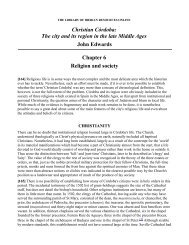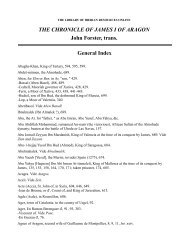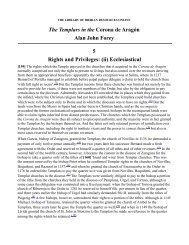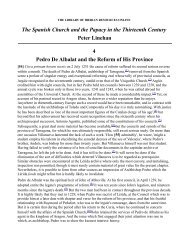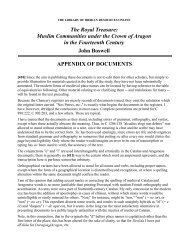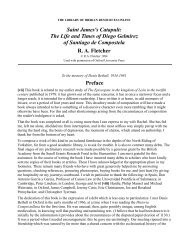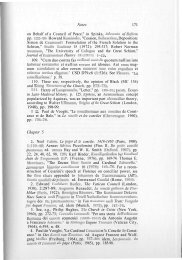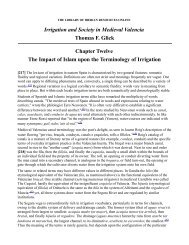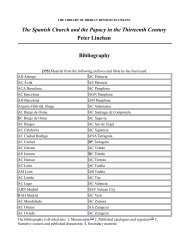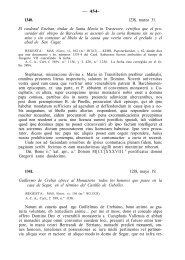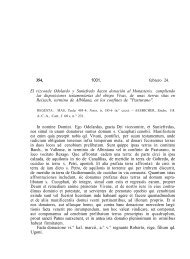PROTESTANTISM - The Library of Iberian Resources Online
PROTESTANTISM - The Library of Iberian Resources Online
PROTESTANTISM - The Library of Iberian Resources Online
You also want an ePaper? Increase the reach of your titles
YUMPU automatically turns print PDFs into web optimized ePapers that Google loves.
this was a virtual impossibility, and it doubtless proved to be so for, in 1605, we hear <strong>of</strong> certain<br />
Englishmen, who had been admitted to penance with the sanbenito and required to live for two years in<br />
certain monasteries for instruction in the faith; they had contrived to escape, but were tracked and<br />
found on board a French ship, without their sanbenitos. As the tribunal did not care to support them,<br />
they were ordered to be distributed separately to monasteries in the mountains, far from the sea, where<br />
they were, for ten years, to perform labor without pay. (126)<br />
When such irrational cruelty was habitual, international comity and commercial interests alike<br />
demanded that a curb should be placed on the irresponsibility <strong>of</strong> the Inquisition. Accordingly, in the<br />
English treaty <strong>of</strong> 1604, Article 21 provided that the vassals <strong>of</strong> King James, coming to or residing in the<br />
Netherlands or Spain, should not be molested or disturbed on account <strong>of</strong> matters <strong>of</strong> conscience, so long<br />
as they gave no occasion for scandal, and that corresponding instructions should be issued by the king.<br />
This Philip did, under the same date <strong>of</strong> June 15, 1605, ordering that English subjects should not be held<br />
accountable for acts prior to their coming to Spain. While in Spain they were not to be compelled to<br />
enter churches but, if entering voluntarily, due respect must be paid to the Venerable Sacrament and, if<br />
it was met on the street, they must kneel, or take another street or enter a house. If any one were<br />
prosecuted for contravention <strong>of</strong> these rules, only his own property was to be seized, and not a vessel or<br />
cargo, or the goods <strong>of</strong> others in his charge, and to the observance <strong>of</strong> all this the king pledged his royal<br />
faith and word. <strong>The</strong> Suprema had previously, December 11, 1604, issued instructions similar to those <strong>of</strong><br />
1597 for the Hansa; on July 14, 1605, it transmitted to the tribunals the articles <strong>of</strong> the treaty, but it<br />
seems to have objected to the royal declaration, for it delayed until October 8th embodying its<br />
provisions in a carta acordada. (127)<br />
This was too reasonable to be acceptable to Spanish fanaticism. [465] Archbishop Ribera, in 1608,<br />
varied his efforts for Morisco expulsion with an earnest appeal to the king, expressing the grief which<br />
he had never ceased to feel since he heard <strong>of</strong> the peace with England, fearing, as he did, the <strong>of</strong>fence<br />
given to God which would bring many evils on Spain. His affliction had increased in view <strong>of</strong> the<br />
excesses committed by the English in Valencia, living publicly in their religion and causing great<br />
scandal and evil example to the faithful and, at much length and with many instances, he proved that<br />
peace with infidels was forbidden by Holy Writ. This memorial was duly considered in the Council <strong>of</strong><br />
State, when the Comendador Mayor <strong>of</strong> Leon reported that the king had ordered the inquisitor-general to<br />
be notified, so that he might instruct the tribunals to exercise great vigilance and to punish all who gave<br />
occasion for scandal. (128)<br />
When, in 1609, the twelve years' truce was concluded with the United Provinces, the Dutch naturally<br />
claimed the same privileges as the English, and these were embodied in Article 7 <strong>of</strong> the treaty. (129) <strong>The</strong><br />
Inquisition did not submit quietly to this restriction on its powers and, in 1612, it issued a carta<br />
acordada, repeated in 1616, asserting that these privileges applied only to transient strangers, and that<br />
those who were resident and kept houses were subject to the tribunals in all matters <strong>of</strong> faith like any<br />
Spanish subjects; it invoked, moreover, an old regulation <strong>of</strong> 1581, ordering special watch to be kept on<br />
them, so that what they did in private as well as in public might be known, full reports being sent to the<br />
Suprema. In 1620 it revived another instruction <strong>of</strong> 1581 forbidding foreigners in the seaports to keep<br />
inns or lodging houses. (130) Whether any trouble arose from these arbitrary [466] constructions <strong>of</strong><br />
international compacts does not appear, but at least they manifested a desire to render the position <strong>of</strong><br />
foreign heretics as precarious and uncomfortable as possible.<br />
When the truce with Holland expired, in 1621, <strong>of</strong> course the privileges <strong>of</strong> the Dutch were withdrawn<br />
and, when war with England came in 1624, the Inquisition eagerly assumed the <strong>of</strong>fice <strong>of</strong> purifying<br />
Spain from heretical infection. Inquisitor-general Pacheco informed the king that papal permission had



